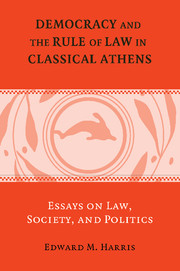Book contents
- Frontmatter
- Contents
- PREFACE
- ACKNOWLEDGMENTS
- ABBREVIATIONS
- INTRODUCTION
- I LAW AND CONSTITUTIONAL HISTORY
- 1 Solon and the Spirit of the Law in Archaic and Classical Greece
- 2 Pericles' Praise of Athenian Democracy
- 3 Antigone the Lawyer, or the Ambiguities of Nomos
- 4 How Often Did the Athenian Assembly Meet?
- 5 When Did the Athenian Assembly Meet? Some New Evidence
- 6 Demosthenes and the Theoric Fund
- II LAW AND ECONOMY
- III LAW AND THE FAMILY
- IV ASPECTS OF PROCEDURE
- V ENVOI
- BIBLIOGRAPHY
- INDEX LOCORUM
- SUBJECT INDEX
3 - Antigone the Lawyer, or the Ambiguities of Nomos
Published online by Cambridge University Press: 25 February 2010
- Frontmatter
- Contents
- PREFACE
- ACKNOWLEDGMENTS
- ABBREVIATIONS
- INTRODUCTION
- I LAW AND CONSTITUTIONAL HISTORY
- 1 Solon and the Spirit of the Law in Archaic and Classical Greece
- 2 Pericles' Praise of Athenian Democracy
- 3 Antigone the Lawyer, or the Ambiguities of Nomos
- 4 How Often Did the Athenian Assembly Meet?
- 5 When Did the Athenian Assembly Meet? Some New Evidence
- 6 Demosthenes and the Theoric Fund
- II LAW AND ECONOMY
- III LAW AND THE FAMILY
- IV ASPECTS OF PROCEDURE
- V ENVOI
- BIBLIOGRAPHY
- INDEX LOCORUM
- SUBJECT INDEX
Summary
the athenians believed that of all three forms of government only democracy measured up to the ideal of the rule of law. Aeschines (1.4–6) says that what distinguishes democracy from oligarchy and tyranny is that the Athenian type of government is ruled by the established laws, whereas the latter two are ruled by the whim of those in power. In a democracy the bodies of all citizens are protected by the laws, whereas the tyrant and the oligarch rely on suspicion and armed guards to protect only themselves. Theseus in Euripides' Supplices (429–37) denounces tyranny because under that type of regime the law is in the hands of one man who rules by himself. Under democracy written laws are the common possession of all citizens and enable the weak to have equal justice with the rich. Not only did democracy promote the rule of law, but the rule of law also kept the democracy strong and safe. Demosthenes (25.21) holds that next to the gods the laws are responsible for protecting Athens. Aeschines (3.6) states that when the Athenians observe the laws, the democracy is kept safe. Conversely, when men lost respect for the rule of law, the democracy was threatened. According to Aeschines (1.179), when the courts allow themselves to be distracted by irrelevant charges, the laws are ignored, and the democracy is undermined.
The ideal of the rule of law figures prominently in funeral orations delivered at Athens for those who died fighting for the community. Pericles in the Funeral Oration given to him by Thucydides (2.37.3) boasts that the Athenians obey both those placed in positions of power and the laws.
- Type
- Chapter
- Information
- Democracy and the Rule of Law in Classical AthensEssays on Law, Society, and Politics, pp. 41 - 80Publisher: Cambridge University PressPrint publication year: 2006
- 1
- Cited by



